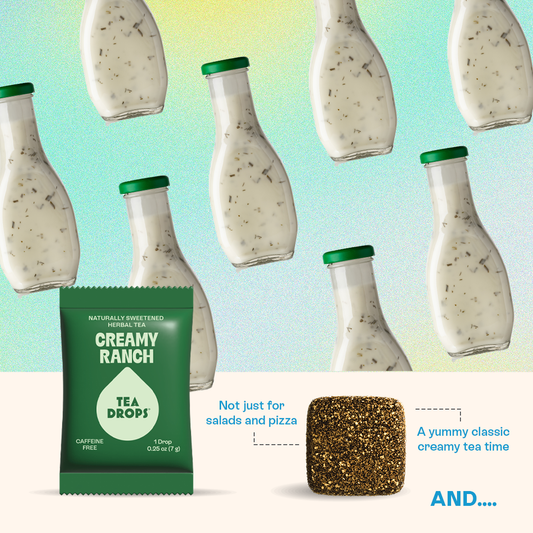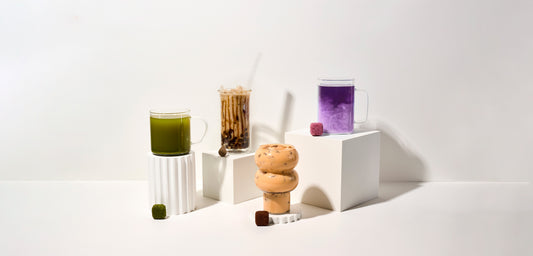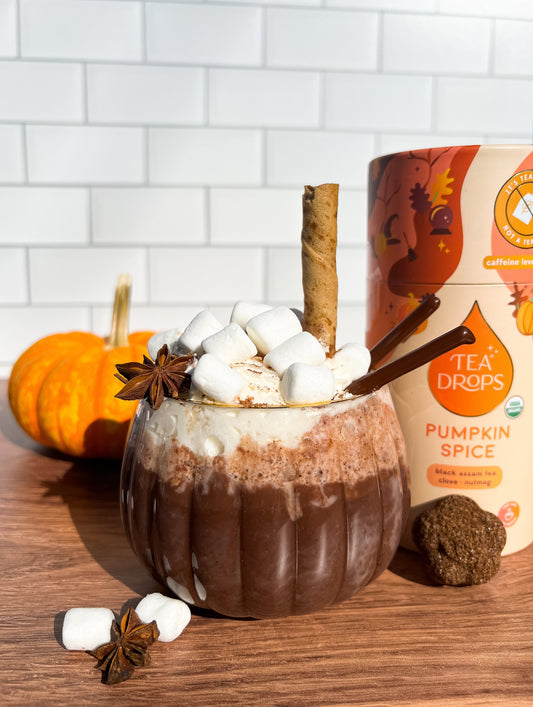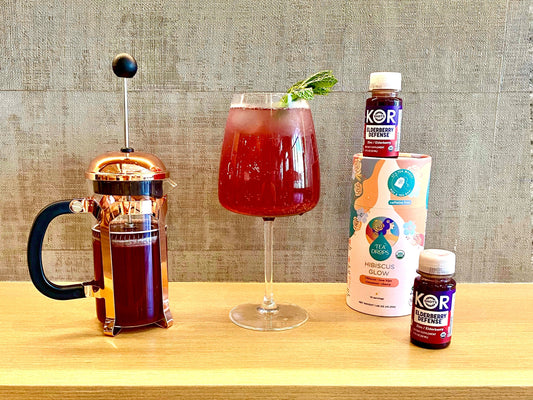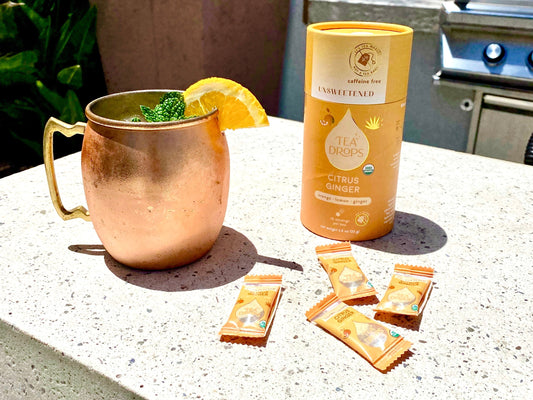
While black, green, and oolong make quite the splash, there is another true tea that often gets overlooked. White tea enjoys the most minimal processing when it comes to the tea harvest and is, therefore, the most delicate. This gentle and glowing pale brew is slightly sweet and free from the bitter notes that are sometimes present in other kinds of tea that come from the Camellia Sinensis plant. Along with its pale and pretty taste, white tea (whether in loose leaf form or as tea bags) also comes with a bounty of health benefits too. From glorious glowing skin and shiny hair to fighting cancer and keeping calm, here we delve into the luminous delights and white tea health benefits.
Meet White Tea
Part of the true tea family, white tea also comes from the tea plant known as Camellia Sinensis. This plant is abundant across the world, but white tea tends to come from the Fujian province of China. It is processed gently and much lighter than black, green, and oolong. White tea is plucked even before the leaves start to unfurl. The white tea buds are covered with fine white snow-like hair which gives the tea its name.
White tea has quite an illustrious history. While we all know that tea has forever been the drink of favor for emperors and imperial dynasties, white tea made its way onto the scene in the 18th century. It didn’t make it out of China for quite some time as the fresh young buds were deemed delicate and it was tricky to transport them without them spoiling. Tea was much too precious to take that risk.
White tea is truly a tea of elegance. It’s all about subtlety and can charm everyone from the most experienced tea connoisseurs to those who just love the ritual of curling up with a good cup.
White Tea Types

There are several different kinds of white tea, all with beautiful names and delicate tasting properties. While this tea was first discovered and dreamed up in China, many countries have adopted the pleasures of white tea and many have created their own version of this vivacious and delicious drink. Here are a few white tea varieties you may come across.
White Peony
This is a blended and slightly tweaked version of the original white tea. It is also found in China and other countries too. The white peony variety isn’t as old as the silver needle version, and its buds are blended with young leaves that have just started to crack open.
Silver Needle
The silver needle white tea comes from the Fujian province of China and from the original plant that first delivered white tea into our world. The plant has beautiful big buds with silver-white hairs adorning every surface, gifting it the name it is known by.
Tribute Eyebrow
Also grown in the most popular white tea regions of China, namely Fujian and Guangxi, the tribute eyebrow tea (also known as Gong Mei) is picked a little later in the season than the silver needle and thus has a bolder and stronger flavor that has been compared to the tastes of oolong tea.
Long Life Eyebrow
Another tea that is harvested later and considered to be not as high quality as Silver Needle or White Peony. In fact, Long Life Eyebrow also known as Shou Mei is made using the leftover leaves of the other harvests. It is also a stronger tea with a bolder color scheme and a deeper flavor range.
Ceylon White
This is a relatively rare version of white tea and comes from Sri Lanka. It is made using the longest silver tea buds and has a delicate light and honey-like flavor.
How is White Tea Made?
The difference between the teas that come from the Camellia Sinensis plant lies in the oxidation process. The longer the leaves are allowed to oxidize the deeper the richness of the tea becomes. Black tea is left the longest which is why it has that bold and dark color. White tea leaves are barely touched in the oxidizing process, it is simply left to soak up the sun and wither down to its dried and natural format. Because of the way in which white tea is processed it holds on to all that natural herby fresh and garden bright flavors. It is delicate and different kinds of white tea will boast different tasting notes – some are spiced, some are fragrant like fruit, and others are earthy.
7 Striking Health Benefits of White Tea

From boosting heart health to cutting down on chronic diseases, encouraging health cholesterol, keeping your blood pressure in a safe space, and even being dietitian-approved, the consumption of white tea is radiant with rich health properties. The makeup of antioxidants and catechins, the pinch of caffeine, and the compounds of L-theanine and EGCG make an award-winning combo for kicking your health up a notch or two. Let’s take a closer look at exactly how white tea can benefit your body.
1. Improves Heart Health
With heart disease being one of the leading causes of death in the USA, it’s never too early to start thinking about getting your ticker in the best shape possible. White tea may be able to lend a helping hand. This beautiful brew has shown positive results in studies regarding teas effect on heart disease. Its believed that the polyphenols and antioxidants found in tea can help to relax blood vessels. Studies also pointed towards participants who drank three cups of tea a day had lowered their heart disease risk by 21%.
2. Helps to Lose Weight
For those looking to shift some extra weight whether for health reasons, then white tea can be the metabolism boost you need. This tea may be delicate but it certainly knows how to pack a punch when it comes to helping your body get on track. White tea also contains caffeine and EGCG (AKA the compound known for burning fat). A test-tube study even showed that white tea had the capability to improve your metabolism by up to 5%. White tea also helps your body to absorb nutrients meaning that you can get all the good stuff you need and live a healthier more harmonious life.
3. May Promote Better Skin and Anti-Aging
Get gorgeous glowing skin all by drinking more dreamy white tea. With its powerful array of antioxidants, white tea is able to help protect the skin (and the body) against free radicals. Free radicals lead to the physical signs of aging contributing to everything from wrinkles to the skin losing its youthful elasticity. White tea can also help to improve the immune system function of cells leading to a lush and quicker turnover along with the added bonus of reducing inflammation in the skin which can keep your face smooth and breakout free.
4. May Help to Fight Diabetes
Our body needs the know-how to make the right level of insulin to stay healthy and well and also to avoid developing diabetes. Unfortunately, insulin resistance and diabetes are on the rise and its important to do all we can to keep this at arm’s length. This is where white tea comes in. Again, the awesome polyphenols in white tea can help as they have been found to significantly reduce the risk of insulin resistance and can help prevent high blood sugar levels.
5. Helps With Hair Health
One of the most important ingredients stashed within white tea is epigallocatechin gallate. This compound is also known by its easier name of EGCG and along with a ton of other benefits, it also helps to promote hair growth and can prevent premature hair loss too. ECGC has also shown promising results in studies with regards to its ability to treat scalp infections and diseases that tend to be resistant to other traditional forms of treatment.
6. May Help to Fight Colon Cancer
As the second most common cause of death in the USA, cancer is a big problem and finding ways to reduce the risk is of the utmost importance. Tea has long been studied to see if it can help cut down those risks and white tea extract has been found to help suppress the growth of cancer cells in the colon. In a double test-tube study it was found that white tea had a positive effect on stopping cancer cells from spreading and also helped to protect normal cells from harmful molecule damage.
7. Increase Calmness, Focus & Energy
Of all the ‘true teas’, white tea comes with the highest concentration of L-theanine. L-theanine has been known to tap into that brainpower and to have a positive impact on alertness and your ability to focus. Next time you are sitting down to study, you can pour yourself a cup of white tea and let it feed your mind the magic it needs. White tea also helps reduce anxiety and stress thanks to the GABA connection.
Does White Tea Have any Side Effect?
It’s worth noting that being born from the Camellia Sinensis plant means that white tea does contain caffeine and if you are someone who is super sensitive to caffeine, you may want to swap it out for a caffeine-free tea instead. Even if you are a caffeine drinker, remember everything in moderation is always good. Too much caffeine can lead to trouble sleeping and dizziness and may cause gastrointestinal discomfort too.
White Tea Caffeine and Calorie Content
While white tea does contain caffeine it is relatively low in comparison to other more popular teas. A cup of black or green tea can contain an amount of caffeine around 30-50mg and white tea contains less than that marker. It’s believed that keeping your caffeine intake below 400mg a day doesn’t tend to have a negative effect on the average person. In terms of calorie counting, white tea is often praised for its weight loss properties and also comes with a low-calorie count and can even curb sugar cravings.
How to Enjoy White Tea?
Check out our Vanilla White Tea
As one of the teas boasting a more delicate flavor you will want to brew up white tea at a relatively low temperature and also use clean fresh and if possible purified water. In an ideal world (or for those with electric kettles), you should let the water boil to 175f so as not to scorch the leaves when you leave them steeping.
You can sip white tea in the winter when you are craving a steaming cup of warmth or you can enjoy it chilled and iced on a hot summers day too. It also works well in a latte topped with your favorite non-dairy or dairy milk and with a shot of flavor – almond, vanilla, whatever you adore.
While you can enjoy white tea any time of day, it does have caffeine content so for all those who are sensitive to caffeine, you may want to skip this brew before bedtime.
Standard White Tea Brewing Process
1. Boil your water to between 175-190f if possible
2. Add a teaspoon of tight compact buds into your strainer or infuser. That’s one teaspoon per 8oz cup or if using wider open leaves you can use a tablespoon per cup instead.
3. To make the process super simple, you can also use Tea Drops White Tea Blend in either the fragrant and exotic vanilla blend or opt for a fruity, fresh blend of Blueberry Acai. With the Tea Drop, you simply add it to your cup and pour it over the water. Voila!
4. If using leaves, pour the water over the strainer and let steep for 1-5 minutes depending on how strong you like it. Any more than 5 minutes and the tea may become bitter.
Wrap Up
White tea is a wonder. For those who love the more delicate taste of tea, this could just be the cup for you. As one of the original teas, you get all those awesome health benefits that the Camellia Sinensis plant brings, along with a fair few others that are unique to white tea too. Laced with anti-inflammatory properties, antioxidant properties, not to mention amino acid, fluoride, and fabulous flavonoids, there's so much wellness in just one cup. As Tea Drops offers two awesome flavors in the white tea range – Vanilla or Blueberry Acai, you can brighten this tea even more and make it part of your daily ritual.
What are your thoughts on white tea? Do you love it or do you prefer other types of tea like herbal teas or magical matcha instead? Share with us in the comments.
Medical Disclaimer: While we have delved into the research available on the health benefits of these teas, this is for informative purposes only and shouldn’t be taken as medical advice. Those who have any health-related queries should reach out to a medical professional. These statements have not been evaluated by the Food and Drug Administration. This article is not intended to diagnose, treat, cure, or prevent any disease.

